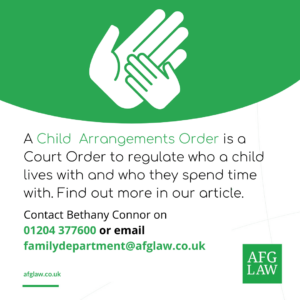
Bethany Connor from our family department explains the process and conditions for Child Arrangements Orders.
A Child Arrangements Order is a Court Order which regulates who a child shall live with and how often a child shall spend time with another person who does not reside with them. A person with parental responsibility can apply for such order, however other people also can which I shall explain later. These orders used to be known as Contact and Residence Orders.
Mediation
Parties are often encouraged to attend mediation in the first instance to see if the arrangements can be agreed outside of the Court area Mediation is much cheaper and can sometimes mean you can reach an agreement quicker, however some cases are no suitable for this and there are several exemptions for mediation such as if domestic violence has formed some part of the relationship, or there are safeguarding issues in respect of the children
It is important to remember that mediation is not legally binding!
You can contact us to discuss mediation further and whether that is
right for you or not.
What conditions can a Child Arrangements Order specify?
A child arrangements order can include the following:
- Who the child(ren) shall live with?
- Where they shall live
- When and how often they will see either parent
- This can include arrangements for special events, such as Birthdays, Christmas, religious holidays
Who can apply for a Child Arrangements Order?
The following people can apply for such order without seeking permission of the Court:
- A parents, Guardian, or Special Guardian of the child
- A spouse or civil partner if the child is part of that family
- Someone with parental responsibility
- Someone who already has a live with order in respect of the child
- Someone who has lived with the child for more than three years
However, other people can also apply, such as grandparents but you need to seek permission from the court first. If you are unsure if you can apply or need permission to apply, please do not hesitate to contact us.
Application
An application for a Child Arrangements Order is a C100 form. This sets out the details of the parties involved, and the details of the children. You will be asked to provide a detailed statement about what orders you are seeking and the reasons why.
If you are alleging Domestic Violence/abuse, then you will also need to complete a C1A form.
We can help you complete the necessary forms should you wish to apply for an Order.
What do the Court consider when granting a Child Arrangements Order?
The Court will consider what is in the best interest of the child when determining whether to make an Order. The child is of paramount importance and will always be at the forefront of the court’s mind.
- To ensure the best interests of the children is consider the court use the’ welfare checklist’ pursuant to the s1(3) of Children Act 1989 which contains the following: The wishes and feelings of the child concerned dependent upon their age and level of understanding
- The child’s physical, emotional, and educational needs
- The likely effect on the child if circumstances changed because of the Court decision
- The child’s age, sex, background, and any other characteristics which will be relevant to the Court decision
- Any harm the child has suffered or may be at risk of suffering
- The capability of the child’s parents at meeting the needs of the child(ren)
- The powers available to the Court in the given proceedings
Generally, a Child Arrangements Order will expire when a child turns 18 years of age unless otherwise stated. However, a court cannot make a Child Arrangements Order for a child who is 16 or 17 years old, unless there are exceptional circumstances.
A Child Arrangements Order is legally binding. This can on occasion mean that if a party such as a parent breaches such order then they will be in contempt of court which could lead to fines, enforcement orders, unpaid work in the community or even imprisonment. These are very rare circumstances.
If you wish to discuss Child Arrangements Orders farther, please call us on 01204 920 104 or email familydepartment@afglaw.co.uk
